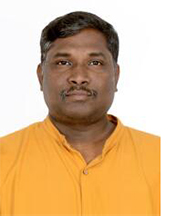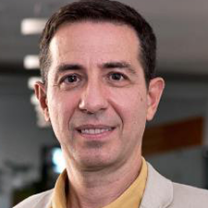Keynote Speakers

Dr. E. S. Gopi
The National Institute of Technology, Tiruchirappalli,India
Dr. E. S. Gopi is an accomplished author, having penned 8 books and edited 2 publications by Springer, focusing on signal processing and pattern recognition. His extensive research output includes numerous papers in esteemed journals, book chapters, and conference proceedings. Boasting 25 years of teaching and research expertise, he currently holds the position of Professor in the Department of Electronics and Communication Engineering at the National Institute of Technology, Tiruchirappalli (Government of India). His authored works enjoy widespread adoption worldwide. One of his notable achievements is the recognition of his book, "Pattern Recognition and Computational Intelligence using MATLAB," by Book Authority, a premier source for book recommendations.
He also serves as the series editor for Springer's "Signals and Communication Technology" series. Dr. Gopi's research prowess was demonstrated through his successful completion of a project offered by GTRE (DRDO), where he served as principal investigator, focusing on "Hunting representative sensors and constructing regression models for between-sensor outcomes using ML."
In addition to his written contributions, Dr. Gopi is recognized for his instructional videos on topics such as "Pattern Recognition," "Statistical Theory of Communication," and "Linear Algebra and Stochastic Process," which have been well-received by students. He is actively involved in academic initiatives, serving as a Workshop, Tutorials & Symposia officer for the Machine Learning for Communications Emerging Technologies Initiative (IEEE ComSoc).
Dr. Gopi has demonstrated leadership in academic events, having organized the first virtual international conference (MDCWC2020) at NIT, Tiruchirappalli, and edited its published proceedings published by Lecture notes in Electrical Engineering, Springer publications. He has also spearheaded numerous workshops, including MDCWC2021, featured as a special session during the IEEE Conference on ICIAfS2021, and MDCWC2021, the first long virtual workshop at NIT, Tiruchirappalli. Notably, he recently convened the second International conference on MDCWC2023 and the proceedings got published in Signals and Communication Technology series, Springer.
An esteemed speaker, Dr. Gopi has delivered invited talks worldwide, including contributions to the Global Initiative of Academic Networks (GIAN) course on "Machine Learning for Wireless Communication" and as a speaker for the IEEE Training School in Machine Learning for Wireless Communication at TOMSK Polytechnic University.
His diverse research interests encompass machine intelligence, pattern recognition, statistical signal processing, and computational intelligence.
URL: https://www.nitt.edu/home/academics/departments/ece/faculty/gopi/
https://sites.google.com/view/gopi-es/home

Prof. Antonio Liotta
Full Professor, Faculty of Engineering, Free University of Bozen-Bolzano, Italy
Antonio Liotta is Full Professor at the Faculty of Engineering, Free University of Bolzano (Italy), where he teaches Data Science and Machine Learning. He is the chairman of the Data-Driven Artificial Intelligence research area and the director of the PhD school in Computer Science. Antonio’s passion for artificial intelligence, has driven his academic career through the meanders of artificial vision, e-health, intelligent networks and intelligent systems. Antonio’s team is renowned for his contributions to micro-edge intelligence and miniaturized machine learning, which have significant potential in harnessing data-intensive systems, for instance in the context of smart cities, cyber-physical systems, Internet of Things, smart energy, and machine learning with humans in the loop. He has led the international team that has recently made a breakthrough in artificial neural networks, initiating a new research strand on “sparse neural networks for embedded learning” (doi.org/10.1038/s41467-018-04316-3). Antonio was the founding director of the Data Science Research Centre at the University of Derby. He has set up several cross-border virtual teams, and has been credited with over 350 publications involving, overall, more than 150 co-authors. Antonio is Editor-in-Chief of the Springer Internet of Things book series (springer.com/series/11636), and associate editor of several prestigious journals. He is co-author of the books “Networks for Pervasive Services: six ways to upgrade the Internet” (springer.com/gp/book/9789400714724) and “Data Science and Internet of Things” (springer.com/gp/book/9783030671969).
Title: “Automatic Speech Recognition in Adverse Acoustic Conditions”
Abstract:Automatic speech recognition (ASR) is crucial to the development of effective voice-controlled applications. In fact, significant progress has been made in the last few years, and ASR multi-language models are readily available. But have these really reached near-human accuracy? And what is missing in the quest for super-human performance under broad acoustic conditions? In this talk, I revisit the status of ASR systems, which are typically trained on millions of hours of ordinary voice samples. I consider the strength of some of the most popular models, looking also at their promises and limitations. To get a more complete panorama of ASRs, I explore their effectiveness under a range of adverse acoustic conditions. As it turns out, ASRs do not yet meet some essential requirements, particularly when it comes to voices that are somewhat impaired or pathological. By means of a recent pilot study on “ASR for pathological voices”, I discuss experimental results, considering diverse models, languages and datasets. ASRs do degrade rapidly in face of typical disturbances, pointing to a number of interesting research propositions.
